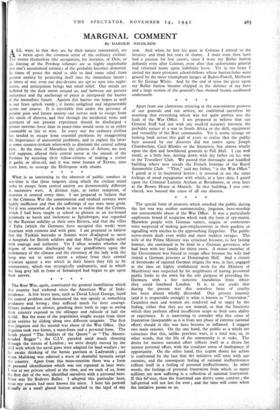MARGINAL COMMENT
By HAROLD NICOLSON
ALL wars, in that they are by their nature nonsensical, are a strain upon the common sense of the ordinary civilian. The events themselves (the occupation, for instance, of Oslo, or the forcing of the Perekop isthmus) are so highly improbable that one's accustomed estimate of the probable becomes distorted. In times of peace the mind is able to find some relief from present anxiety by projecting itself into the immediate future ; in times of war even our diy-dreams are apt to turn into night- mares, and anticipation brings but small relief. Our minds are buffeted by the dark storm around us, and between our present endurance and thg anchorage of peace is interposed the barrier of the immediate future. Against this barrier our hopes as well as our fears splash vainly ; it looms unlighted and impenetrable across our course. It is inevitable that under the pressure of present pain and future anxiety our nerves seek to escape from this circle of distress, and that through the incidental vents and apertures of our present experience should be discharged a greater nervous force than in peace-time would seem to us either reasonable or fair or wise. In every war the ordinary• civilian has tended to escape from essential problems by exaggerating the importance of unessential problems, and to exploit the latter as some counter-irritant wherewith to diminish the central aching pain. At the time of Marathon the citizens of Athens, we may well suppose, allayed their central terror at the onrush of the Persians by accusing their fellow-citizens of making a corner in garlic or olive-oil, and it was most human of Xerxes, nine years later, to scourge the Hellespont with chains.
. * * * *






















 Previous page
Previous page